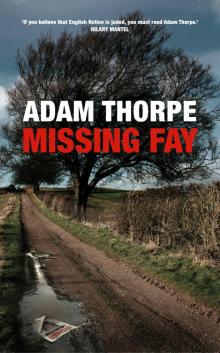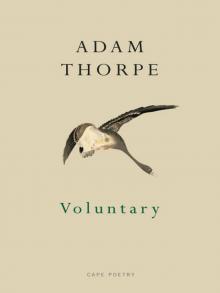- Home
- Adam Thorpe
The Standing Pool Page 16
The Standing Pool Read online
Page 16
‘You found proof that it wasn’t voluntary?’
‘Kind of. I’ll show you my notes. It’s not straightforward.’
Nick had used the Centre several times both before and after he’d met Sarah, and he now recalled finding the records of the Bureau de Recherches de Pétrol’s subsidiaries in Gabon and the Congo, with the usual story of corruption, displacement of locals and so on; and how the files were warped and stained by the African climate, with tiny red splotches of squashed mosquitoes; and how, since the Bureau de Recherches de Pétrol was now Elf-Total, he’d expected a visit from hitmen in dark glasses, almost as much as he had when digging up details about Chevron in Chad – in Chad itself – a few years earlier, which was quite another story (Sarah had, of course, heard it many times).
‘You’d have been so lucky,’ murmured Sarah, fully upstaged.
‘My paper wasn’t completely ignored,’ he went on. ‘There was some disgruntlement in the trade mags and one or two annual reports. Esso’s, for instance, mentioned it.’
Sarah had enjoyed her few hours away, especially the drive there with the CD-player blaring out her Dylan (not Nick’s favourite); what she omitted to tell him was that she had not been able to stop herself worrying about the girls. You either worried or you didn’t: you couldn’t worry a bit, like you couldn’t be a bit pregnant, or a bit Nazi. As it turned out, on her return the girls were deep in a board game with their father in front of the fire and had barely looked up. She’d felt redundant. She’d expected them to run towards her and fling themselves at her skirt.
‘We’ve had a great time,’ Nick had confirmed, just in case she was in any doubt.
The Smiths were playing on the hi-fi: ‘Suffer Little Children’. A song she didn’t like at all – about the Moors Murders. Inappropriate. It was on quite loud, too.
‘I’m starving,’ she said. ‘How’s the omelette?’
‘As you can see,’ said Nick, ‘still in the project stage.’
‘And the girls not even in their pyjamas?’
‘French time,’ he murmured, trying not to show his own irritation.
‘By the way,’ he told her, pouring out more wine at the end of supper, ‘I met the local shepherd. Bruno.’
The omelette was fine, in the end. The only flat note, as usual, was the bread: thawed out; fresh each day was impossible. It was a round trip of about three-quarters of an hour to the baker’s in Valdaron, including the wait as folk chatted. Sarah had put the girls to bed and was only now unwinding after a couple of hours of appeasement. Nick felt exhausted.
‘The kids told me, yes.’
‘Fascinating. His greatest dream is to visit Greenland.’
‘You don’t say.’
‘So I said to him, “Well, if it’s for the glaciers you’re going, you’d better hurry up.”’
‘That’s pretty advanced, if it was in French.’
‘I paraphrase,’ said Nick. ‘It’s simpler in French. Si c’est pour les glacières, il faut aller vite là-bas.’
‘Glacières? You’re sure that’s right?’
Nick groaned. Sarah looked it up in the French-English dictionary, tipping the page towards the candle-flame.
‘Glacière is, I’m afraid, an ice-box. Glacier is glacier,’ Sarah announced, looking pleased.
‘No wonder he laughed,’ Nick chuckled, gamely. ‘Actually, he didn’t laugh, he was too polite. He just looked puzzled for a second.’
‘Eef eet ees for zee ice boxes, you must go qweek to there,’ said Sarah.
‘Better than zee ice burgers, I suppose. Or buggers, even.’
They were in fits, worse than Alicia and Tammy in the doctor’s surgery. They polished off the wine, still laughing, and that was that. It was good to be back, thought Sarah. She told Nick about the dishy young Arab guy in the reading room, looking up registers of military recruitment in colonial Algeria; he wasn’t allowed to reproduce it in any form, he’d whispered to her.
‘In your ear?’
‘In my ear.’
Nick pulled a shocked face, pretending not to be bothered. He did not broach the other matter, about the builder, about the builder’s accident and the anniversary flowers. He saw no need. Now she was happy, he felt he could be disgruntled, anyway. Rain began to spatter against the shutters like bursts of typing. Then, after stopping to think about it, the storm broke. At least, they reckoned it was a storm. It drummed on the roof all night, as if it would rather be inside. It made the track into a temporary collection of streams and gouged channels through the gravel at the front. It smacked on the pool and appeared to have raised the level by several centimetres. Sarah, squeaking the shutters open slightly and looking out at the wall of water in the middle of the night, was reminded of Africa, and all that she had not, after all, achieved or (more to the point) dared.
Logs were brought the next day and deposited next to the barn. Some rolled into the strip of briar and charred stones. Everything glittered after the rain, and they thought they could see the snowy flanks of the Alps: a suggestion of whiteness like little teeth, that wasn’t cloud.
The ancient lorry looked much the worse for wear, with broken wing-mirrors and a dented bonnet, and made a terrible din as it bashed its way along the worsened track. The little ‘log-man’, as they called him, was almost perfectly square (Tammy’s description), with a squashed nose and huge leathery hands. He showed Nick how best to stack logs, each layer crossways on the previous layer, so that the air might get in and dry them quicker. He admitted the logs were a bit green and may need splitting. They were certainly wet. The stack was begun inside the barn, just to the left of the entrance.
Nick couldn’t find gloves and the wood seemed to sap all the moisture from his skin, despite the wetness. He initially enjoyed the unthinking task, although it seemed to take ages before any inroads were made on the sprawling heap outside. The two older girls intermittently helped, clutching a single log to the chest or choosing fat sticks, which they stacked separately for kindling. The air was washed clean but not cold, although the log-man assured them that April could be frosty.
His body engaged, Nick’s mind kept returning to the shepherd’s grim tale. He toyed with the idea of not telling Sarah at all. Of trying not to dwell on it, let it float away as most things did in the end, but it remained obstinately moored in his head.
The poor man had been working for the Sandlers. He’d landed just there. He felt bad, now, about the memorial flowers.
Thump. Broken neck. Rabbit punch.
There was something vaguely distasteful about the way the Sandlers hadn’t mentioned it, but he could totally understand their position. It had nothing to do with them, the Mallinsons, it was something that had happened in the past, a few years back, and it could stay there. His instinct was to probe, but he fought it. This sabbatical was about living in the present. It was about dwelling on what mattered, letting time run through his fingers without trying to hold it, to clasp what couldn’t be clasped. Because time was above all a liquid. Time was the historian’s worst ally, like the ultimate peer review.
Time had surprised him, especially by dissolving his Marxist foundations. He had drifted from Habermas and Jameson to the unlikely port of Gilles Deleuze, a thinker for whom everything is displacement, contingency and indeterminacy, like worrying medical conditions. For several years he’d been taken up with domestic problems: his hyper-active first son, Jamie; his aged mother – who’d gone from benevolent sharpness, deep in her whist and bridge in Crowthorne, to blunt recalcitrance and dementia. (She was, he’d say, a paradigm of the West.) He left Helena and met Sarah – not in that order, come to think of it.
He rarely read his contemporaries in the field, there was far too much thanks to the research ratings nonsense: everything was seething – teasing proliferation instead of debate and reflection. It was the fundamental sign of Deleuze’s unsynthesised present, he once wrote (adding to the seethe): experience undergone, not yet passed into memory. None of it, t
hen, had meaning: it was a disparate jumble. Only the cocaine of virtual communication had meaning. At times during this difficult period he had craved a simpler world, a world of mud roads and burning faiths. Simple, stark choices. He’d crave to be back in that world, to be a peasant in the chill plough-lines of feudalism, looking up at the God-filled sky. He had, in other words, become the precise opposite of what he was in his youth.
That’s what time did, because it was liquid. It wasn’t a sea, of course, but a river – as large and powerful as the Congo river, on whose banks he had several times marvelled in earlier years. He could find no more original metaphor for time. He wasn’t a poet. What poetry he read, of the modern kind, he mostly found obscure and baffling.
Maybe he was more prophet than historian, he thought, stacking a large log cloaked in pubic moss, a soft pelt against his hands. The girls had gone in, bored.
The car. The computer. Mortgages and shopping. All of us have fallen for it – hook, line and sinker. Again and again. It won’t be the bathing and anointing, the ewers of fresh wine, the cushioned recliners, the slaves to light our way; it’ll be the toilet paper we’ll miss.
He was enjoying the logs, the creaminess of the bared timber, the criss-cross layering, the woodblock strikes of it.
When Sarah was pregnant with Tammy, was it – his return to Michelet’s history of France? His marvelling at it? The rekindling of Nicholas Mallinson! Dates, dates. His own dates fuzzed. Tammy, precocious Tammy, plus two more. Unruliness. Whole hours thrown into the air like confetti. The days and then weeks and then months, gobbled up. Years. His scholarly biography of Ferdinand Lassalle had taken five of them, and it was scarcely noticed. His more approachable book on the pre-war history of African oil exploration, Tending the Reserves, was remaindered after a year (he first knew of this in a second-hand bookshop in Brighton). His first major appearance in a TV documentary as a talking head last year, illuminating the build-up to Suez, dismayed him: he looked venerable, despite the strange, purplish light on his face.
Looking back from his sixth decade, he was astonished (particularly in the sleepless middle of the night, when whispering, malicious elves took over) by the brevity of what had been his life so far. ‘The syncope of the long breath’, as that young colleague in English put it in one of his published poems. The new man whose name he can never remember, and who expects you to have read him. Who has, in fact, been at FitzHerbert’s for at least five years.
Yet, as a teenager, life had seemed to stretch out to infinity. The simple grasslands of life. The reeds waving to the boundless horizon.
All these logs will be burnt.
He supposed that, if he was insufferably ideological, it was not just in reaction to his own Deleuze period. A tiny handful of people in suits were looting the world. Ransacking it. Casino hustlers, tilting the tables. Consumerism as another, very subtle form of slavery. Founded on literal slavery, if you think about it, if you delve a little deeper.
Oil, too, was liquid. What could be as deadly dull, as viscously horrible, as that one word oil; or be as tediously monotonous as the repetition of that dry, flat, scrubland name, Chad? But the intellect’s pistons had begun to move again in tune with his heart, and he’d seen how his life’s work might, after all, cohere.
Sarah was suffering because of it, her own work obscured by his enthusiasm, his reborn zeal. For ‘oil’ had become his mantra, the thread that made sense of it all: of thirty years of scholarship. The two older girls would pretend to switch their ears off when he talked about his work. He was a gangly bore, and he knew it. When he looked at photographs of himself as a rebellious adolescent, all he could see was his trousers set too high and the absurd explosion of hair in which his pale face stared out like a mouse from its nest. He wondered who those creatures were, who loved themselves, and how contented they must be in their innocence.
By the time he’d stacked the last log, he’d covered an awful lot of ground. He was mentally exhausted, and the tendons around his right elbow burnt.
He stood by the clear pool for a moment, wondering why it had a deposit of what looked like snow or white ash covering the bottom. Maybe that’s what happened when you clarified things: the fog just solidified.
Jean-Luc fishes under his bed and pulls out a cardboard box.
Inside the box is rubbish, including a rusty kitchen sieve, broken plastic toys, old spoons, lots of birds’ feathers, silvery stones from the river, a plastic bowl split on one side, cheap paperbacks swollen by damp, and the doll. She jumps leglessly onto the table and then he fishes out the sieve and places it next to her. He touches the sieve, orange at the joins of the mesh, and it rocks from side to side. Then he lays Bibi inside it and watches her rock with it, like a naked girl in a round hammock, missing her legs but still beautiful.
She is stuck. Like a fly in a cobweb. He stops the sieve rocking and holds it still. He feels excited, now. All he needs, then, is a spider. A big black spider. He’d watch cobwebs for hours, as a kid. The spider wrapping up the fly in a white cocoon, the fly struggling at first, then giving up. He’d pretend to be the fly, lying on the floor and being wrapped up in sticky thread. He couldn’t move his arms for ages.
In the corner of his room, a real cobweb flutters in a draught from the window, which won’t close properly since the rains. It is an old cobweb, so old the spider is a bony white skeleton inside it. He considers using the skeleton for a moment. No, too fragile. It’ll crumble to bits at a touch. He knows what he has to find: something like that bundle of tiny bones. He can look out for it. Again, he feels a surge of pleasure inside him. Bibi is the fly, despite her Jesus nails. But who is the spider?
Himself, he thinks. Everything is himself, from inside him. Even Bibi. Even the cobweb.
His mother is calling his name. She’s beginning to shriek it out, only muffled by the door. She needs help to do her doings. But she can wait. He doesn’t want to destroy this moment.
He thinks of the Englishwoman at Les Fosses, probably a little older than himself. Marie, he murmurs, my sweet sister in love. He needs a photograph of her, he is sure about that. Of her cold face, and of her warm face. Then he will rub the cold face out. He has to have a photograph of her smile, her lost look.
A secret photograph.
Because if she knew he was taking it, she would not put on that lost look. She would not look like Marie. All he needs is a camera.
His mother has stopped, worn out by calling his name. Now she will wet the bed, deliberately. He will let her, so that he can scold her. Scold her as once she scolded him. He won’t let her take over. He is the boss, here. Then he remembers there are no more clean sheets; he has neglected the washing. The nurse comes in the morning, but it’s not her job to do the washing. The nurse, called Elodie, binds his mother’s swollen legs in a tight bandage, gives her the medicines, chirrups and twitters to cheer her up. Jean-Luc quite likes Elodie, who is young and businesslike with short mousy hair and heavy eyebrows, but he is always afraid she will find some fault in the way he does things. Then she might wrap him up tightly in her long white bandage, over and over, and sit on his face.
He studies the wall where the rain ran down during the night. Always in the same place: the dark brown streak glistens, that’s all. And in the morning there’s a big puddle on the floor where the old stain is. The old bruise.
Once, when Elodie found bruises on his mother’s arms, blue as a tattoo, she gave him a suspicious glance. He made a joke of it: ah yes, I’ve been clobbering her a lot lately! And the nurse and his mother laughed. And so did he. In fact, it was when he had lifted her up off the bolsters to rearrange them: she bruised easily. He had strong hands. One forgot.
His mother was always older than other mothers, mothers of his contemporaries. She had him at forty-two. It wasn’t normal, to have your first and only child at forty-two. Not around here, at any rate. Maybe there was some problem.
The excitement has passed. It comes and goes. It can be triggered by pull
ing out the cardboard box of rubbish, but it’s so easily dissolved. In a few minutes he will go downstairs and watch Marie-Sylvaine on her chat show while getting the supper together. That cheers him up.
He thinks he hears a laugh through the door. His mother is probably pissing into her bedclothes right at this moment, just to spite him. It’ll go right through to the rubber sheet, which will stink unless it’s taken off and rinsed. He gets up from the chair so abruptly the chair falls backwards and he’s unlocked the door and has leapt into her room before the back hits the lino.
It happened when they were all watching television – French television – from various vantage points on the sofa or the rug or both at once. The show consisted of a panel of about ten guests laughing hysterically at their own jokes. They were all ugly. The audience members appeared to be watching a mildly depressing documentary. The Mallinsons, large and small, scarcely understood a word.
The other channels were umbrageous, shifting shapes in a blizzard. One seemed to be about the economy. They stopped on what was either a rugby match or a documentary on migrating caribou.
‘Maybe the aerial needs adjusting,’ said Sarah.
Nick grunted. ‘What aerial?’
‘Isn’t there one? Up on the roof?’
‘Is there? Haven’t noticed it.’
‘I don’t know,’ she said, feeling she was sounding like her mother.
They flicked back to adverts on TF1, the channel that worked: they understood those, at least.
‘The semiotics of Omo,’ said Sarah, although it was an advert for a car. She yawned. ‘Nearly time for bed, kids.’
‘We can ask Jean-Luc to check the aerial,’ Tammy suggested.
‘And then he’ll go up on the roof,’ Sarah said.
‘So what?’
‘He might fall off,’ she pointed out, with a hint of a chuckle.

 Missing Fay
Missing Fay Hodd
Hodd Pieces of Light
Pieces of Light The Standing Pool
The Standing Pool Ulverton
Ulverton Nine Lessons From the Dark
Nine Lessons From the Dark Flight
Flight The Rules of Perspective
The Rules of Perspective From the Neanderthal
From the Neanderthal Is This the Way You Said?
Is This the Way You Said? Still
Still No Telling
No Telling Voluntary
Voluntary Between Each Breath
Between Each Breath